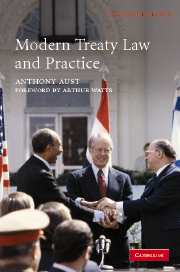Book contents
- Frontmatter
- Contents
- Foreword to the first edition by Sir Arthur Watts
- Preface to the second edition
- Articles of the Convention cited in the text
- Table of treaties
- Table of MOUs
- Table of cases
- Glossary of legal terms
- List of abbreviations
- Introduction
- 1 Vienna Convention on the Law of Treaties 1969
- 2 What is a treaty?
- 3 MOUs
- 4 Capacity to conclude treaties
- 5 Full powers
- 6 Adoption and authentication
- 7 Consent to be bound
- 8 Reservations
- 9 Entry into force
- 10 Treaties and domestic law
- 11 Territorial application
- 12 Successive treaties
- 13 Interpretation
- 14 Third states
- 15 Amendment
- 16 Duration and termination
- 17 Invalidity
- 18 The depositary
- 19 Registration and publication
- 20 Dispute settlement and remedies
- 21 Succession to treaties
- 22 International Organisations
- 23 Drafting and final clauses
- Appendices
- Index
5 - Full powers
- Frontmatter
- Contents
- Foreword to the first edition by Sir Arthur Watts
- Preface to the second edition
- Articles of the Convention cited in the text
- Table of treaties
- Table of MOUs
- Table of cases
- Glossary of legal terms
- List of abbreviations
- Introduction
- 1 Vienna Convention on the Law of Treaties 1969
- 2 What is a treaty?
- 3 MOUs
- 4 Capacity to conclude treaties
- 5 Full powers
- 6 Adoption and authentication
- 7 Consent to be bound
- 8 Reservations
- 9 Entry into force
- 10 Treaties and domestic law
- 11 Territorial application
- 12 Successive treaties
- 13 Interpretation
- 14 Third states
- 15 Amendment
- 16 Duration and termination
- 17 Invalidity
- 18 The depositary
- 19 Registration and publication
- 20 Dispute settlement and remedies
- 21 Succession to treaties
- 22 International Organisations
- 23 Drafting and final clauses
- Appendices
- Index
Summary
We have judged it expedient to invest a fit person with Full Power to conduct negotiations on Our part in respect of Our United Kingdom of Great Britain and Northern Ireland: Know, therefore, that We, reposing especial Trust and Confidence in the Wisdom, Loyalty, Diligence and Circumspection of our Trusty and Well-beloved Sir Patrick Henry Dean, Knight Commander of Our Most Distinguished Order of Saint Michael and Saint George …
The quotation is but a small extract from old-style full powers which were still used by the United Kingdom not so long ago. Some states may still use similar antiquated nonsense. It is therefore not so surprising that an air of mystery still surrounds the topic. Admittedly, it is not the most thrilling aspect of the law of treaties, but failure to follow the complex, but clear, rules on full powers can lead to much needless extra work, vexation and, indeed, even embarrassment.
Full powers are no more than a document produced as evidence that the person named in it is authorised to represent his state in performing certain acts in relation to the conclusion of a treaty, in particular its signature. The production of full powers is a fundamental safeguard for the representatives of other states that they are dealing with a person with the necessary authority. This is equally important for the depositary of a treaty in view of the heavy responsibilities he has to discharge.
- Type
- Chapter
- Information
- Modern Treaty Law and Practice , pp. 75 - 83Publisher: Cambridge University PressPrint publication year: 2007

